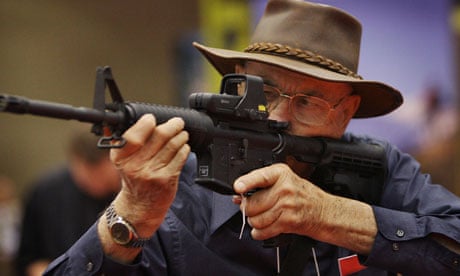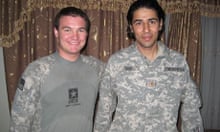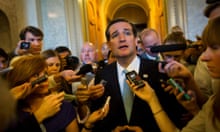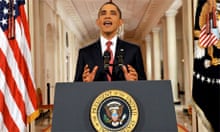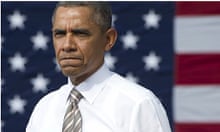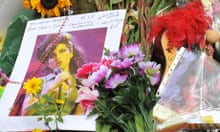Last week, Starbucks asked its American customers to please not bring their guns into the coffee shop. This is part of the company's concern about customer safety and follows a ban in the summer on smoking within 25 feet of a coffee shop entrance and an earlier ruling about scalding hot coffee. After the celebrated Liebeck v McDonald's case in 1994, involving a woman who suffered third-degree burns to her thighs, Starbucks complies with the Specialty Coffee Association of America's recommendation that drinks should be served at a maximum temperature of 82C.
Although it was brave of Howard Schultz, the company's chief executive, to go even this far in a country where people are better armed and only slightly less nervy than rebel fighters in Syria, we should note that dealing with the risks of scalding and secondary smoke came well before addressing the problem of people who go armed to buy a latte. There can be no weirder order of priorities on this planet.
That's America, we say, as news of the latest massacre breaks – last week it was the slaughter of 12 people by Aaron Alexis at Washington DC's navy yard – and move on. But what if we no longer thought of this as just a problem for America and, instead, viewed it as an international humanitarian crisis – a quasi civil war, if you like, that calls for outside intervention? As citizens of the world, perhaps we should demand an end to the unimaginable suffering of victims and their families – the maiming and killing of children – just as America does in every new civil conflict around the globe.
The annual toll from firearms in the US is running at 32,000 deaths and climbing, even though the general crime rate is on a downward path (it is 40% lower than in 1980). If this perennial slaughter doesn't qualify for intercession by the UN and all relevant NGOs, it is hard to know what does.
To absorb the scale of the mayhem, it's worth trying to guess the death toll of all the wars in American history since the War of Independence began in 1775, and follow that by estimating the number killed by firearms in the US since the day that Robert F. Kennedy was shot in 1968 by a .22 Iver-Johnson handgun, wielded by Sirhan Sirhan. The figures from Congressional Research Service, plus recent statistics from icasualties.org, tell us that from the first casualties in the battle of Lexington to recent operations in Afghanistan, the toll is 1,171,177. By contrast, the number killed by firearms, including suicides, since 1968, according to the Centres for Disease Control and Prevention and the FBI, is 1,384,171.
That 212,994 more Americans lost their lives from firearms in the last 45 years than in all wars involving the US is a staggering fact, particularly when you place it in the context of the safety-conscious, "secondary smoke" obsessions that characterise so much of American life.
Everywhere you look in America, people are trying to make life safer. On roads, for example, there has been a huge effort in the past 50 years to enforce speed limits, crack down on drink/drug driving and build safety features into highways, as well as vehicles. The result is a steadily improving record; by 2015, forecasters predict that for first time road deaths will be fewer than those caused by firearms (32,036 to 32,929).
Plainly, there's no equivalent effort in the area of privately owned firearms. Indeed, most politicians do everything they can to make the country less safe. Recently, a Democrat senator from Arkansas named Mark Pryor ran a TV ad against the gun-control campaign funded by NY mayor Michael Bloomberg – one of the few politicians to stand up to the NRA lobby – explaining why he was against enhanced background checks on gun owners yet was committed to "finding real solutions to violence".
About their own safety, Americans often have an unusual ability to hold two utterly opposed ideas in their heads simultaneously. That can only explain the past decade in which the fear of terror has cost the country hundreds of billions of dollars in wars, surveillance and intelligence programmes and homeland security. Ten years after 9/11, homeland security spending doubled to $69bn . The total bill since the attacks is more than $649bn.
One more figure. There have been fewer than 20 terror-related deaths on American soil since 9/11 and about 364,000 deaths caused by privately owned firearms. If any European nation had such a record and persisted in addressing only the first figure, while ignoring the second, you can bet your last pound that the State Department would be warning against travel to that country and no American would set foot in it without body armour.
But no nation sees itself as outsiders do. Half the country is sane and rational while the other half simply doesn't grasp the inconsistencies and historic lunacy of its position, which springs from the second amendment right to keep and bear arms, and is derived from English common law and our 1689 Bill of Rights. We dispensed with these rights long ago, but American gun owners cleave to them with the tenacity that previous generations fought to continue slavery. Astonishingly, when owning a gun is not about ludicrous macho fantasy, it is mostly seen as a matter of personal safety, like the airbag in the new Ford pick-up or avoiding secondary smoke, despite conclusive evidence that people become less safe as gun ownership rises.
Last week, I happened to be in New York for the 9/11 anniversary: it occurs to me now that the city that suffered most dreadfully in the attacks and has the greatest reason for jumpiness is also among the places where you find most sense on the gun issue in America. New Yorkers understand that fear breeds peril and, regardless of tragedies such as Sandy Hook and the DC naval yard, the NRA, the gun manufacturers, conservative-inclined politicians and parts of the media will continue to advocate a right, which, at base, is as archaic as a witch trial.
Talking to American friends, I always sense a kind of despair that the gun lobby is too powerful to challenge and that nothing will ever change. The same resignation was evident in President Obama's rather lifeless reaction to the Washington shooting last week. There is absolutely nothing he can do, which underscores the fact that America is in a jam and that international pressure may be one way of reducing the slaughter over the next generation. This has reached the point where it has ceased to be a domestic issue. The world cannot stand idly by.
